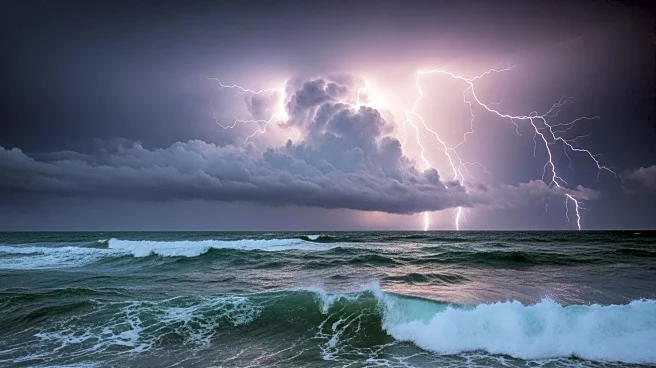What is the story about?
What's Happening?
A recent study conducted by Climate Central has found that human-amplified climate change is leading to more intense hurricanes in the Atlantic. The study, published in the journal Environmental Research: Climate, analyzed hurricanes between 2019 and 2023 and discovered that 84% of these storms were, on average, 18 mph stronger due to climate change. This increase in wind speed resulted in 30 hurricanes reaching a higher category of strength than they would have in a world without human-induced climate change. The study highlights the role of rising sea surface temperatures, fueled by global warming, in the rapid intensification of these cyclones. For instance, Hurricane Milton intensified by 120 mph in less than 36 hours, with ocean temperatures at record levels, a situation made significantly more likely by climate change.
Why It's Important?
The findings of this study underscore the growing impact of climate change on natural disasters, particularly hurricanes, which have devastating effects on communities. Stronger hurricanes lead to increased damage, higher economic costs, and greater loss of life. Since 1980, tropical cyclones have resulted in $1.4 trillion in damages and over 7,200 fatalities. The study's results emphasize the urgent need for policies aimed at reducing carbon emissions and mitigating climate change to prevent further intensification of hurricanes. Communities, especially those in hurricane-prone areas, may face heightened risks and need to adapt their disaster preparedness and response strategies accordingly.
What's Next?
The study suggests that without significant action to curb carbon emissions, hurricanes will continue to grow stronger, posing increased threats to coastal regions. Policymakers and environmental groups may push for more aggressive climate action plans to address the root causes of global warming. Additionally, there may be increased investment in infrastructure to withstand stronger storms and in research to better predict and understand the impacts of climate change on weather patterns.
Beyond the Headlines
The study raises ethical and legal questions about the responsibility of nations and industries contributing to climate change. As the effects of climate change become more pronounced, there may be calls for accountability and reparations from those most responsible for carbon emissions. Furthermore, the cultural dimension of how communities perceive and respond to climate-related disasters could shift, with greater emphasis on sustainability and resilience.















